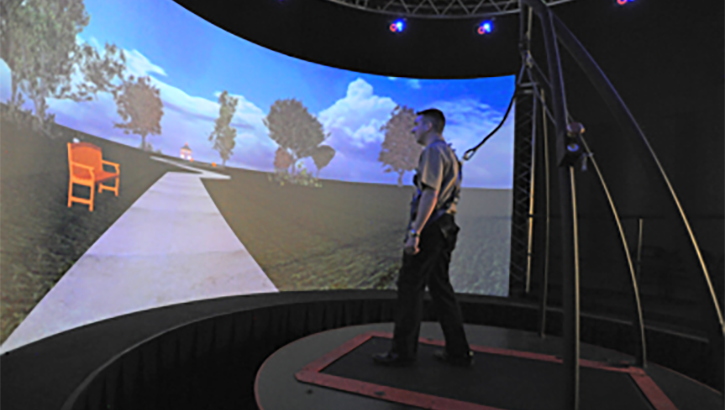NICoE, NHRC Team Up To Make CAREN Technology Portable
 The Computer Assisted Rehabilitation Environment (CAREN) at the National Intrepid Center of Excellence (NICoE) offers clinicians a VR-based tool to assess and treat patients with TBI and PTSD. (Photo by Linsey Pizzulo, National Intrepid Center of Excellence)
The Computer Assisted Rehabilitation Environment (CAREN) at the National Intrepid Center of Excellence (NICoE) offers clinicians a VR-based tool to assess and treat patients with TBI and PTSD. (Photo by Linsey Pizzulo, National Intrepid Center of Excellence)
8/12/2021
By:
National Intrepid Center of Excellence Communications
Since the National Intrepid Center of Excellence opened in 2010, Biomedical Engineer Sarah Kruger has operated the center’s Computer Assisted Rehabilitation Environment (CAREN).
The CAREN is a large-scale virtual-reality system used to evaluate and treat NICoE patients with traumatic brain injury (TBI) and posttraumatic stress disorder (PTSD).
Now, her team is collaborating with researchers at the Naval Health Research Center (NHRC) to scale the technology down to a mobile system, with the long-term goal of making the novel therapy more attainable throughout both the Military Health System and the Defense Intrepid Network for TBI and Brain Health.
“Head-mounted display technology has become more affordable and accessible over the past couple of years,” said Kruger. “It’s also portable. So we want to leverage what we’ve learned about the [CAREN] system and see if we can make it possible to use similar treatments without committing the space or funding to a CAREN.”
In the CAREN, the patient stands or walks on a treadmill in the middle of a circular platform while interacting with virtual environments projected in front of them onto a 9-foot-tall, 180-degree screen. The platform can tilt in all directions to mimic a rocking boat, an uphill climb, or other scenarios as a ring of motion-capture cameras track movement, allowing for real-time modifications to the environment.
Monitoring the patient’s behavior, physical therapists can assess and treat conditions such as vestibular dysfunction - one of the most common complaints following a TBI - and PTSD.
In initial discussions about using head-mounted displays for treatment, NICoE physical therapists expressed concern that the devices might be too heavy for their many patients with neck pain. So the NICoE and NHRC teams evaluated several different headsets and, after positive feedback from clinicians, chose an augmented-reality (AR) based head-mounted display which has a lightweight visor that allows digital content to be layered over the existing real-world environment.
Application developers then worked to transition some of the CAREN’s most frequently utilized virtual environments over to a cross-platform game engine that allows for improved graphics, physics, and user control. The new environments are compatible on both the CAREN and AR headset.
These systems are currently being evaluated in two IRB-approved research protocols for a multisite vestibular physical therapy project, where data is being collected at both NICoE and NHRC.
Last month, the research team provided an overview of the development process in a symposium presentation at the International Conference on Virtual Rehabilitation. Kruger, physical therapist Kathleen Delpy, and research scientist Kerry Rosen represented the NICoE; with NHRC physical therapist Dawn Bodell and biomedical engineers Pinata Sessoms, Vrajeshri Ordek, and Jacob Van Dehy.
While there are some clear differences between the CAREN and the head-mounted display - for instance, the CAREN makes it easier for patients to find real-world anchors and use their peripheral vision - Kruger does not consider them to be dealbreakers.
“There are obviously limitations to using [the mobile system],” she said, “but if I can get a 75% solution that clinicians will use, I’ll take it.”
The key to this health innovation is that the head-mounted displays are portable and can potentially be used at multiple locations without requiring a full-size CAREN. There are pros and cons to the new technology, but in the end, they may help make TBI and PTSD care more accessible to MHS patients.